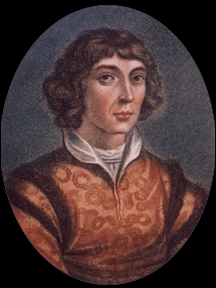Seleccionar idioma español/Choisissez la langue français

Nicola(u)s Copernicus (Mikolaj Kopernik) was born in Poland in 1673. His parents died when he was twelve, and he was entrusted to his uncle (soon to be the Bishop of Ermland), who sent him to the University of Cracow (astronomy) and then to Bologna (Greek, mathematics, Plato) and Padua (law and medicine) and Ferrara (Doctor of Canon Law). Having been elected a canon of Frauenberg (Frombork)Cathedral, he returned home, assisted his uncle until the uncle's death, and then opened a free clinic for the poor.
His interests were many and varied, including theology, poetry, and the natural and social sciences. He is the first known formulator of what we now call Gresham's Law ("Bad money drives out good"— that is, if there are two kinds of coins in circulation that have the same legal or face value, but one is more valuable in terms of its content (say a silver dime and a cupro-nickel "sandwich" dime), consumers will tend to hoard the more valuable coins and spend the less valuable ones, so that soon only the less valuable ones will be in circulation).
He is chiefly remembered, however, for his work as an astronomer. In his day, the common view of the world was the geocentric model— the theory that the earth was a motionless sphere and that the heavenly bodies all revolved around it. There was a minority view: Cardinal Nicholas of Cusa, for example (Papal legate to Germany, who by careful measurements showed that a growing plant did not derive its increased mass principally from the soil, but rather from the air, and who died a century before Galileo was born) wrote: "When we say that the earth does not move, we mean simply that the earth is the point with reference to which man makes his observations of celestial phenomena." But, by and large, the stability of the earth, backed by what was thought to be good scientific evidence, was the view that prevailed. (It is often said that medieval Christians thought that the earth was flat, but that is pure hoax. Dante, writing in the early 1300's, refers to the earth as a sphere, and so does Thomas Aquinas in the opening section of the Summa Theologica, and so does Bede in the early 700's, and so does Irenaeus in the late 100's. The issue was not shape but motion.)
The geocentric model had been interwoven with other theories in chemistry, physics, music, natural theology, and other disciplines, into one unified theory of nature, so that it seemed that rejecting any single part (such as the stability of the earth) imperilled the whole theory. However, as the astronomers of the day measured the motions of the heavenly bodies with increasing accuracy, and the theory was patched up to fit the measurements, it became an increasingly awkward theory. Copernicus proposed to simplify it by supposing that the sun, not the earth, was at the center. He first produced a summary of his theory in 1530 in a paper called the Commentariolus, which received papal approval. He then spent the next thirteen years revising it, expanding it to book length, rechecking his calculations, rewriting his arguments, postponing publication until he was sure that he had not overlooked something. (Some writers today will know the feeling.) Finally, he entrusted it to an old pupil, Georg Rhaeticus, a professor at Leipzig, who published it there, with a preface added by the Lutheran pastor Osiander stating that the heliocentric model was only a device to simplify computations. The printed book, called De Revolutionibus Orbium Caelestium (The Revolutions of the Heavenly Bodies), was brought to Copernicus only a few hours before his death 24 May 1543.
His work roused little opposition at first, but when Galileo quarreled with the University establishment in Italy and finally with the Pope, the whole geocentric model fell under suspicion and Copernicus's book was placed on the Index "donec corrigetur" ("until it be corrected") from 1616 to 1758.
written by James Kiefer
Almighty God, who have made the heavens to tell your glory and the firmament
to proclaim your handiwork: we bless you for placing us in a rational universe,
and for giving us rational minds suited for understanding it; and today we
praise you especially for the gifts of intellect that you have given to your servants
Nicolas Copernicus and others, by which our understanding of the nature of
your creation has been much advanced, to our good and your glory, who live and
reign, Father, Son, and Holy Spirit, one God, now and for ever. Amen.